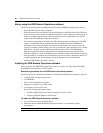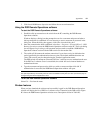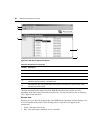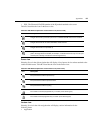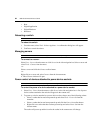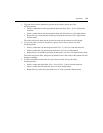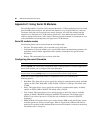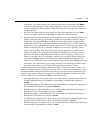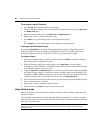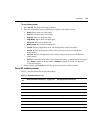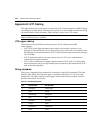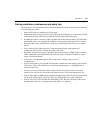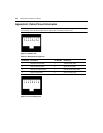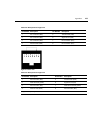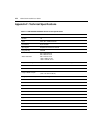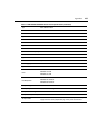
98 DSR Switch Installer/User Guide
To configure a serial IQ module:
1. Press Ctrl-F8. The Configuration Screen will appear.
2. Select a parameter to change. You can navigate the Configuration Screen using the Up Arrow
and Down Arrow keys.
3. Modify the selected value using the Left Arrow and Right Arrow keys.
4. Repeat steps 2 and 3 to modify additional values.
5. Press Enter to save your changes and exit the Configuration Screen.
-or-
Press Escape to exit the Configuration Screen without saving the changes.
Creating a serial IQ module macro
Pressing the Page Down key when the Terminal Applications menu’s Configuration screen is
displayed will provide access to the Macro Configuration screen. The serial IQ module can be
configured with up to 10 macros. Each macro can be up to 128 characters in length.
To create a macro:
1. Select the serial IQ module you wish to configure and press Ctrl-F8 to activate the Terminal
Applications menu’s Configuration screen.
2. When the Terminal Applications menu appears, press Page Down to view the Macro
Configuration screen. The Macro Configuration screen shows the 10 available macros and the
associated key sequences, if any, for each.
3. Using the Up Arrow and Down Arrow keys, scroll to an available macro number and highlight
the listed keystroke sequence. Type the new macro keystroke sequence over the default. Any
combination of
Ctrl or Alt and a single key may be used. When you have finished entering the
keystroke sequence that will activate the new macro, press the
Down Arrow key.
4. On the line below the macro keystroke sequence you just entered, type the keystroke sequence
that you wish the macro to perform.
5. Repeat steps 3 and 4 to configure additional macros.
6. When finished, press Enter to return to the previous screen.
Using History mode
History mode allows you to examine the contents of the history buffer, which contains the events
that have occurred.
The serial IQ module maintains a buffer containing 240 lines minimum, or 10 screens, of output.
When the history buffer is full, it will add new lines at the bottom of the buffer and delete the oldest
lines at the top of the buffer.
NOTE: The Config Key Sequence, On-Line Key Sequence and Clear History Key Sequence used in the
following procedure are the default values. These key combinations can be changed using the Terminal
Applications menu.



